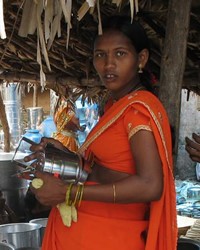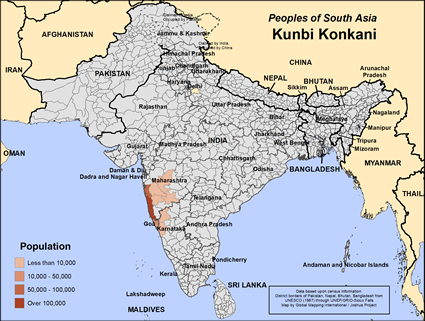Kunbi Konkani in India

Photo Source:
Thanuja Mummidi - Flickr
Creative Commons
|

Map Source:
People Group data: Omid. Map geography: UNESCO / GMI. Map Design: Joshua Project.
|
| People Name: | Kunbi Konkani |
| Country: | India |
| 10/40 Window: | Yes |
| Population: | 674,000 |
| World Population: | 674,000 |
| Primary Language: | Konkani, Goan |
| Primary Religion: | Hinduism |
| Christian Adherents: | 0.00 % |
| Evangelicals: | 0.00 % |
| Scripture: | Complete Bible |
| Ministry Resources: | Yes |
| Jesus Film: | Yes |
| Audio Recordings: | Yes |
| People Cluster: | South Asia Hindu - Kunbi |
| Affinity Bloc: | South Asian Peoples |
| Progress Level: |
|
Introduction / History
The Kunbi (alternate names of Reddi and Desai) are a prominent community of Gujarat. Traditionally the Reddy belong to the fourth of the Hindu Varnas, Sudra. One section of the Kunbi are the Konkani speakers, so they are known as the Konkani Kunbi.
What Are Their Lives Like?
The majority of the Kunbi communities are non-vegetarian, and all the communities take rice as their staple cereal. Jowar, wheat, bajra and ragi are the other cereals they eat. Both men and women smoke a homemade cheroot (chutta) which results in a high incidence of mouth and throat cancer.
The Konkani Kunbi community have social divisions such as clans, lineage, subcastes and sects. These social divisions regulate marital alliances. The Kunbi allow for cross-cousin marriages. They allow widows to remarry. Being a dominant community, they are often landlords and landholders. Those less fortunate are paid laborers. Social control is regulated through traditional caste and village councils.
What Are Their Beliefs?
The Konkani Kunbi are Hindus who worship many deities. Their main festivals are Ugadi, Akshade and Dussehra. They play bhajans and kirtans at these festivals.
What Are Their Needs?
The Konkani Kunbi fear Christianity as an invading religious system to their families and communities. They need hearts that do not fear coming close to the King of kings.
Prayer Points
Pray for Konkani Kunbi people to have the spiritual hunger it takes to stand for Jesus even in the face of community pressure.
Pray that God may send several Christian workers to work among them and meet their spiritual and physical needs.
Pray for Konkani speaking Christians to reach out to them.